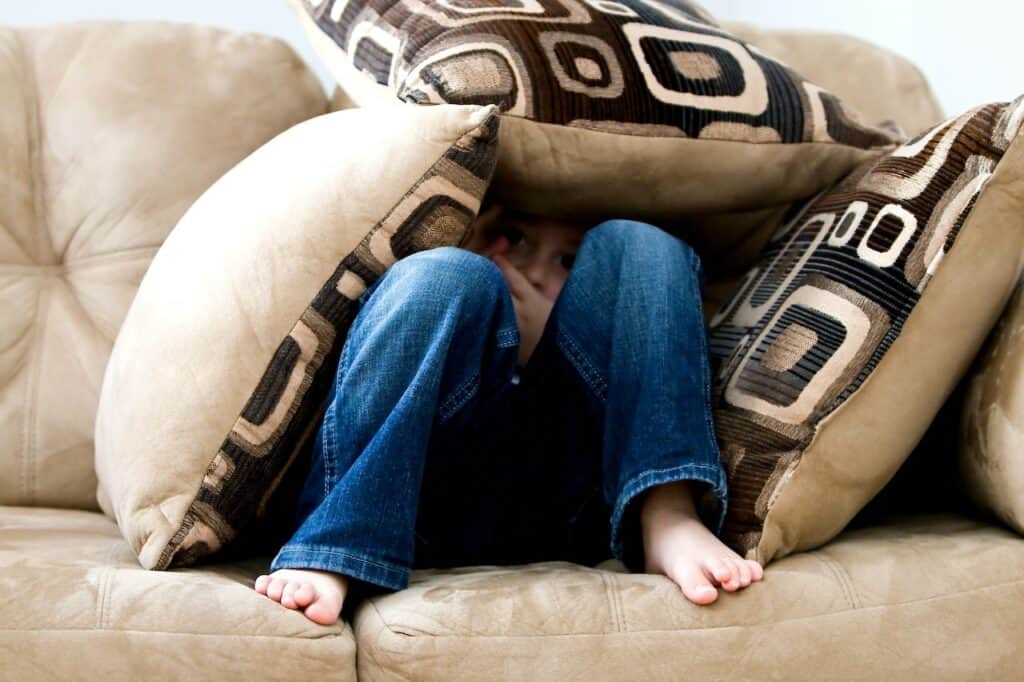A parent’s worst nightmare is discovering their young child’s obsession with private parts. It can be a shocking and confusing experience, leaving parents wondering what to do and how to react. While it is a common behavior for young children to be curious about their bodies, frequent and public obsessions may raise concerns about their development and safety.
Understanding children’s curiosity towards their private parts is crucial in addressing this behavior. It is a natural part of their development as they explore their bodies and learn about their physical differences. However, it is important to distinguish normal behavior from uncommon or aggressive behavior that may indicate underlying issues such as stress or sexual abuse.
Key Takeaways
- Understanding children’s curiosity towards their private parts is a natural part of their development.
- Parents play a crucial role in responding to their child’s frequent and public obsessions.
- Identifying and addressing stress-related behavior and recognizing signs of sexual abuse are important steps in promoting healthy attitudes towards private parts.
Understanding Children’s Curiosity
Children are naturally curious beings, and it is common for them to explore their bodies and the world around them. At a young age, children are still learning about their own bodies and the differences between boys and girls. It is not uncommon for a 6-year-old child to be curious about private parts and ask questions about them.
It is important for parents and caregivers to understand that this curiosity is normal and healthy, and should not be shamed or discouraged. Instead, adults can use this as an opportunity to teach children about their bodies and boundaries in a safe and age-appropriate way.
When talking to children about private parts, it is important to use proper anatomical terms such as penis, vagina, and vulva. This helps to normalize these body parts and reduce shame or embarrassment. Adults can also explain that private parts are called private because they are meant to be kept covered and not touched by others without permission.
It is also important to set boundaries with children around their own bodies and the bodies of others. Children should be taught that their bodies belong to them and that they have the right to say no to unwanted touches. They should also be taught to respect the bodies of others and understand that touching someone else’s private parts without permission is not okay.
Overall, it is important to approach conversations about private parts and children’s curiosity with a neutral and knowledgeable tone. By providing accurate information and setting appropriate boundaries, adults can help children develop a healthy understanding of their bodies and relationships with others.
Normal Behavior and Development
It is not uncommon for young children to be curious about their bodies, including their private parts. In fact, it is a normal part of childhood development. Children may explore their bodies through touching or even masturbating, which can be a source of confusion or concern for some parents.

It is important to understand that genital play and masturbation are typical behaviors in young children and do not necessarily indicate any underlying psychological or emotional issues. In fact, children who engage in these behaviors are often just exploring their bodies and learning about their own sensations and feelings.
Parents can help their children understand appropriate boundaries and behaviors by providing clear and consistent guidance. This may include explaining the difference between public and private behaviors and setting limits on when and where it is appropriate to touch oneself.
It is also important for parents to remain calm and non-judgmental when discussing these issues with their children. By creating a safe and supportive environment, parents can help their children develop a healthy understanding of their bodies and their sexuality.
Parental Role and Response
Parents play a crucial role in shaping their child’s behavior, including their attitudes towards their private parts. When a child becomes obsessed with their private parts, parents must respond in a calm and respectful manner, without judgment or shame.
The first step is to establish trust with the child, so they feel comfortable discussing their feelings and behaviors. Parents should create a safe and open atmosphere where the child can express themselves freely.
It is important to set clear boundaries and explain appropriate touching, such as when it is okay to touch their private parts and when it is not. Parents can use age-appropriate language and visuals to help the child understand the concept of boundaries.
If the child engages in inappropriate touching, parents must react immediately, but without anger or punishment. Instead, parents can calmly explain why the behavior is not acceptable and redirect the child’s attention to a different activity.
Parents should also teach the child about appropriate ways to show affection, such as giving high-fives or standing at an appropriate distance. By modeling respectful behavior, parents can help the child understand the importance of respecting others’ personal space and boundaries.
Overall, parents must approach the situation with confidence and knowledge, while keeping a neutral and clear tone of voice. By responding in a respectful and appropriate manner, parents can help their child develop healthy attitudes towards their private parts and understand the importance of safety and boundaries.
Sexual Education for Young Children
Sexual education is an important topic for children of all ages, including young children. It is important to provide age-appropriate information that is clear, neutral, and knowledgeable. Parents and caregivers should be prepared to answer questions about sex and sexuality in a way that is appropriate for their child’s age and level of understanding.

When discussing private parts with young children, it is important to use proper names for body parts. This helps to establish a clear vocabulary and promotes a healthy understanding of the body. Parents and caregivers should also be prepared to answer questions about sex and sexuality in a way that is appropriate for their child’s age and level of understanding.
There are many books and resources available to help parents and caregivers discuss sex and sexuality with young children. These resources can provide guidance on how to answer questions and how to approach the topic in a way that is appropriate for young children.
It is also important to be aware of the music and media that young children are exposed to. Parents and caregivers should monitor the content that their child is exposed to and be prepared to answer any questions that may arise.
Overall, sexual education for young children should be approached in a confident and knowledgeable manner. By using proper names for body parts and providing age-appropriate information, parents and caregivers can help promote a healthy understanding of sex and sexuality.
Addressing Frequent and Public Obsessions
When a child becomes fixated on their private parts, it can be a confusing and concerning situation for parents and caregivers. This type of obsession can manifest in frequent and public displays of genital touching or talk, which can be embarrassing for both the child and those around them.
It’s important to address these behaviors in a calm and non-judgmental manner. While it’s natural for young children to be curious about their bodies, it’s also important to teach them about privacy and modesty.
For preschoolers and toddlers, it’s important to explain that certain behaviors are only appropriate in private, such as touching their private parts. This can be reinforced by establishing clear boundaries and consequences for breaking them.
For older children, it may be helpful to have a more in-depth conversation about privacy and modesty, as well as the importance of respecting boundaries and the feelings of others. It’s also important to address any underlying issues that may be contributing to the obsession, such as anxiety or stress.
In some cases, a child’s obsession with their private parts may be a way of seeking attention or coping with difficult emotions. In these situations, it’s important to provide alternative outlets for their emotions and to offer support and understanding.
It’s also important to consider the impact that this type of behavior may have on the child’s peers and siblings. It may be necessary to have a conversation with the child’s siblings about respecting each other’s privacy and boundaries.
Overall, addressing frequent and public obsessions with private parts requires a sensitive and understanding approach. By establishing clear boundaries, offering support and understanding, and addressing any underlying issues, parents and caregivers can help their child navigate this challenging situation.
Identifying and Handling Stress-Related Behavior
When a child exhibits stress-related behavior, it can be difficult to know how to handle the situation. One common stress-related behavior in young children is an obsession with their private parts. This can be a difficult behavior to address, but it is important to handle it in a sensitive and appropriate manner.

When a child is stressed, they may exhibit a range of behaviors, including fear, anxiety, anger, emotional distress, tension, yelling, and even physical aggression. It is important to identify the root cause of the behavior in order to address it effectively. In the case of a child obsessed with their private parts, the behavior may be a result of stress or anxiety related to a traumatic event, such as sexual abuse or exposure to inappropriate content.
Parents and caregivers should approach the situation with sensitivity and understanding. Punishing the child for their behavior is not an effective solution and can further exacerbate the child’s stress and anxiety. Instead, it is important to create a safe and supportive environment for the child to express their feelings and concerns.
One effective approach is to engage the child in conversation and encourage them to talk about their feelings and concerns. This can help the child to feel heard and validated, which can help to alleviate their stress and anxiety. It is also important to provide the child with appropriate coping mechanisms, such as deep breathing exercises or other relaxation techniques.
In some cases, it may be necessary to seek professional help. A therapist or counselor can help to identify the root cause of the child’s stress and provide appropriate treatment and support. It is important to seek help as soon as possible in order to address the behavior and prevent it from becoming a long-term issue.
Overall, identifying and handling stress-related behavior in children is a sensitive and complex issue. It is important for parents and caregivers to approach the situation with sensitivity and understanding, and to provide appropriate support and resources for the child.
Recognizing Uncommon and Aggressive Behavior
When dealing with a child exhibiting sexually aggressive behavior, it is important to recognize that not all aggressive behavior is sexual in nature. However, if a child is exhibiting uncommon and aggressive behavior, it is important to address the behavior and determine if it is sexual in nature.
Uncommon behavior may include a child repeatedly touching their own private parts or another child’s private parts, or using sexual language that is not typical for their age. Aggressive behavior may include physically forcing another child to engage in sexual acts or exposing themselves to others.
It is important to understand that sexual behavior in children is not always a sign of abuse. However, if a child is exhibiting forced aggression or engaging in sexual content that is not age-appropriate, it may be a sign that they have been exposed to sexual content or have experienced sexual abuse.
Parents and caregivers should be aware of their child’s behavior and take note of any changes or concerning behavior. If a child is exhibiting uncommon and aggressive behavior, it is important to seek professional help and guidance to determine the cause of the behavior and how to address it.
Understanding and Addressing Sexual Abuse
When a child shows an unusual interest in private parts, it can be a red flag for sexual abuse. Sexual abuse is a crime that can have long-lasting effects on the victim’s mental and emotional health. It is important for parents and caregivers to understand the signs of sexual abuse and take appropriate action.
If a child is displaying an obsession with private parts, it is important to take them seriously and seek professional help. A therapist or specialist can help determine if the child has been sexually abused and provide guidance on how to address the situation.
It is important to note that not all children who show an interest in private parts have been sexually abused. However, it is better to err on the side of caution and seek professional help if there are any concerns.
Parents and caregivers should also educate themselves on the signs of sexual abuse. These signs can include:
- Unexplained bruises or injuries
- Changes in behavior or mood
- Difficulty sleeping or nightmares
- Sexualized behavior or language
- Fear of being alone with certain individuals
If sexual abuse is suspected, it is important to report it to the authorities and seek professional help for the child. It is never too late to seek help and support for victims of sexual abuse.
Promoting Healthy Attitudes Towards Private Parts
It is common for young children to be curious about their bodies, including their private parts. However, it is important to promote healthy attitudes towards private parts to ensure that children understand the importance of respecting their bodies and boundaries.

One way to promote healthy attitudes towards private parts is to teach children that all parts of their body are important and should be respected. This means that they should not be ashamed of their bodies or feel ashamed for touching themselves in private areas. Instead, they should understand that their bodies are theirs and that they have the right to explore and touch themselves in a matter-of-fact way.
Parents and caregivers can also promote healthy attitudes towards private parts by talking openly and honestly about sexual health and development. This can help children understand that touching themselves in private areas can be a normal part of exploration and can even be pleasurable. However, it is important to emphasize that this should only be done in a safe and exploratory way, with mutual agreement and supervision.
It is also important to note that as children grow and develop, their understanding of their bodies and sexuality will change. Adolescents may feel embarrassed or ashamed about their bodies, including their willy or breasts. In these cases, it is important to provide support and reassurance, emphasizing that their bodies are normal and healthy.
Overall, promoting healthy attitudes towards private parts can help children develop a positive body image and a healthy understanding of their own sexuality. By talking openly and honestly about sexual health and development, parents and caregivers can help children feel confident, knowledgeable, and empowered.
Also, read: 4 Year Old Tantrums and Hitting
Frequently Asked Questions
Why is my 6 year old obsessed with private parts?
It is common for children to be curious about their bodies and explore their private parts. At this age, they are learning about their bodies and how they function. It is important to provide age-appropriate education about their bodies and boundaries.
Is it normal for a 6 year old to play with private parts?
Yes, it is normal for a 6 year old to explore their body and play with their private parts. However, it is important to set boundaries and teach them about privacy.
How to get your child to stop touching themselves?
It is important to explain to your child that touching their private parts is something that should be done in private. Provide them with other activities to keep their hands busy and redirect their attention when necessary. It is also important to recognize that this behavior is normal and not to shame or punish your child.
What is the normal behavior of a 6 year old?
At 6 years old, children are learning to be more independent and have a better understanding of their emotions. They may still have tantrums and need help regulating their emotions. They are also curious and may ask a lot of questions about the world around them.
My son keeps grabbing his privates, what should I do?
It is important to have a conversation with your son about appropriate behavior and boundaries. Explain that touching his private parts is something that should be done in private and provide him with other activities to keep his hands busy. If the behavior continues, consider seeking advice from a pediatrician or mental health professional.
Is it normal for a 7 year-old boy to play with himself?
Yes, it is normal for a 7 year old boy to explore his body and play with his private parts. It is important to provide age-appropriate education about their bodies and boundaries, and to set expectations for appropriate behavior.
Related Post: My Daughter Says She Is Pansexual

Iesha is a loving mother of 2 beautiful children. She’s an active parent who enjoys indoor and outdoor adventures with her family. Her mission is to share practical and realistic parenting advice to help the parenting community becoming stronger.
